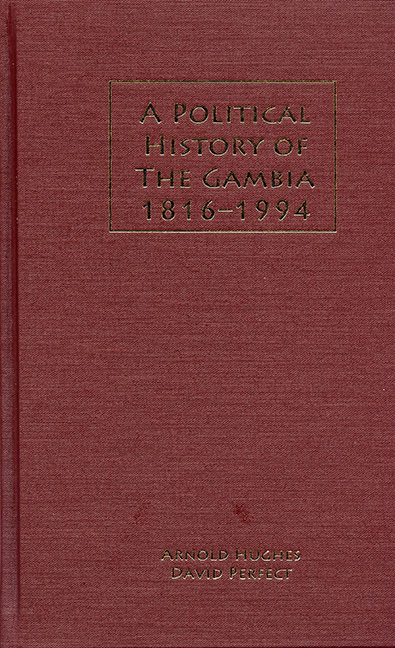One of the most important developments in West Africa in the late 1940s and early 1950s was the sudden proliferation of political parties. Both before and immediately after World War II, most political organizations were of the “congress” type. They had loose-knit structures and sought to embrace all shades of political opinion to achieve specific (and limited) reforms, or to block undesirable legislation. Often as a result of an internal split, these congresses then gave birth to political parties that aimed to mobilize the mass of the population, both for immediate electoral purposes and to hasten the process of decolonization. As the political stakes became higher, rival parties, which often adopted a communal or regional complexion, were formed to challenge the monopoly of the dominant party.
This chapter shows how this transition from the broadly based congress to the more narrowly focused party occurred in The Gambia as elsewhere. Although the Bathurst Ratepayers’ Association (RPA), a typical congress organization, managed to win the first direct election to the Legislative Council in 1947, it was swept aside in the 1951 election by the colony's first genuine political party, the Gambia Democratic Party (GDP). Two other parties, the Gambia Muslim Congress (GMC) and the United Party (UP), were established by the time of the 1954 election. Nevertheless, party politics remained in a fledgling state at the end of the 1950s. Political parties remained undeveloped, with each depending on the personality and actions of its leader. They could therefore be described as “elite” or “patron” parties. Moreover, all parties continued to draw their support exclusively from the urbanized area in and around Bathurst, with the Protectorate remaining very largely excluded from the national political process.
Legislative Council Politics: 1941–47
The death of W. D. Carrol in October 1941, following that of Sir Samuel Forster in 1940, meant that for the first time since 1883, the African Christian community was not represented on the Legislative Council. Governor Southorn did not seek to fill the vacancy left by Forster's death, because he believed that Carrol could adequately represent Christian interests. However, after Carrol's death, Southorn invited the members of the Bathurst Advisory Town Council (BATC) to nominate a successor.
